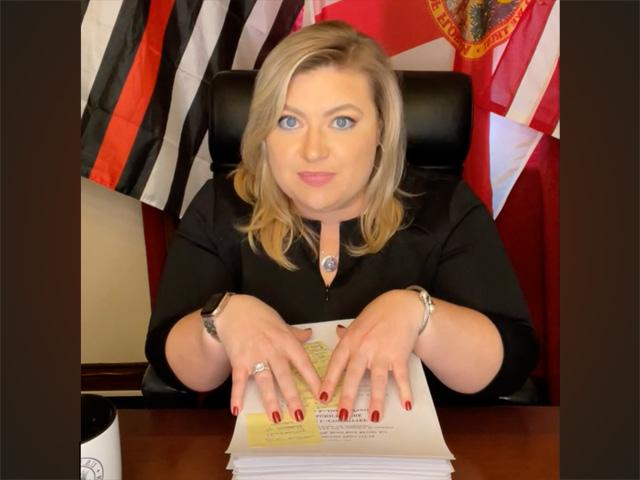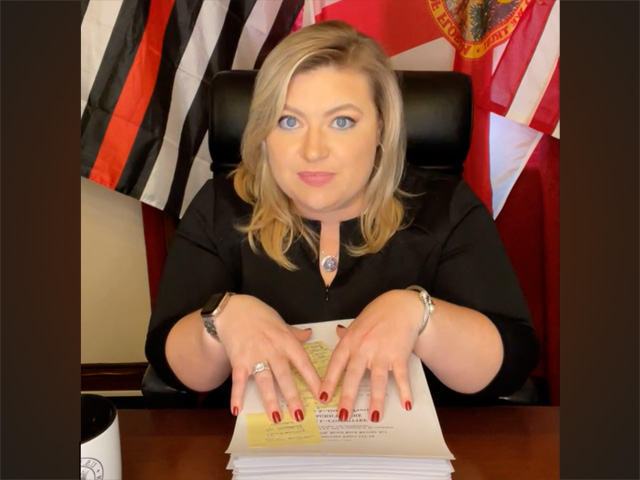Ag Policy Blog
There's No Cow Tax in the Build Back Better Bill
The House Agriculture Committee leadership should hold a hearing after one of its members posted claims on Facebook that the Build Back Better Act would tax cows and cause meat prices to soar.
House Ag leaders from both parties have mentioned the need to vet what is in the bill related to agriculture, and what isn't in the bill. There is a lot of misinformation out there, and some of it is coming from committee members.
Over the weekend, multiple livestock producers emailed DTN staff asking questions about claims made by freshman Rep. Kat Cammack, R-Fla., a member of the House Agriculture and listed at age 33 as the youngest serving member of Congress. Cammack isn't a congressional novice, though, having been chief of staff to Rep. Ted Yoho before running for his seat when Yoho chose not to run last year.
Cammack took to Facebook on the evening of Nov. 4 to talk about "some pretty egregious things" in the "Build Back Broke agenda," as she put it. Cammack then falsely claims the bill would cause meat prices to spike by declaring there are fees on livestock not in the bill.
"If you are a meat eater, if you enjoy a hamburger, a hot dog, a pork chop, a steak -- anything -- if you are a consumer of protein, and not plant-based protein, this is going to do something insane. In this bill, they want to put a fee -- and by they, I mean Nancy Pelosi, and the Democrats and Biden, AOC and the squad -- they want a per-head fee -- $4,500 per beef cow, $6,500 per dairy cow, about $2,500 per hog."
Cammack said the ranchers won't absorb that costs, but it will filter down to consumers. Ground beef would go up to $10 a pound, Cammack said. Then there would be higher costs for milk and cheese, etc.
None of those claims are true.
Cammack's Facebook post from Nov. 4 had 148,000 shares, 81,000 separate reactions from people and 32,000 comments posted on it. Cammack effectively got the reaction she was looking to achieve.
Misinformation about livestock fees in the bill have been circulating for more than a month. Rep. Markwayne Mullin, R-Okla., initially made the same exact comments. He wrote them in a column that ended up in local media throughout his congressional district.
The American Farm Bureau Federation published a statement at the end of September making it clear there was no proposed methane tax in the bill. "To clear up any confusion, I want to make clear that the current language of the reconciliation bill does not impose a methane tax on agriculture." https://www.fb.org/…
P[L1] D[0x0] M[300x250] OOP[F] ADUNIT[] T[]
DTN reached out to Cammack's press staff asking where the congresswoman received her information to make that claim.
UPDATE: Cammack's staff responded Monday afternoon that the Build Back Better Act "does NOT explicitly protect farmers and agriculture. The bill includes funding for the EPA to charge a new few on methane emission from natural gas producers, processors, storage facilities and others. While the bill does not specify livestock as subject to this fee, it does not include any language that excludes it from being subject to the fee in the future."
Cammack and her staff cited that the House Energy & Committee voted down an amendment that would protect industries from a future methane emissions tax.
"Ask yourself why. Why would the Democrats block efforts to make agriculture exempt from these new regulations and fees? If agriculture was not the intended target, the Democrats would have worked to make that clear and exempted the industry," Cammack stated in response to DTN. "Instead, they shot down all of our attempts to protect agriculture and now expect us to take their word for it that our producers aren't their target."
She added, "I think we have a right to be concerned about agriculture's unprotected status at this time. We know that we can't trust the government, because if you give it an inch, it will take ten miles."
The idea that agriculture might not be protected from future regulation is one issue, but that's not what Cammack and others claim. Instead, they argue that the bill fails to protect farmers from a $6,500 per cow methane tax.
When it comes to the "cow tax," this isn't my first rodeo. Rumors spread in late 2008 that EPA was implementing a tax on livestock. The trail at that time lead back to the original claim from the Bush administration USDA, responding to an "advance notice of possible rulemaking" from EPA in which USDA stating "IF" EPA used the Clean Air Act to regulate methane emissions it "COULD" cause EPA to regulate emissions from livestock. That sparked a flurry of false claims that lasted several months across cable news. Social media, at that time, wasn't as advanced as it is now to spread such messages.
So let's walk through this. There are no press statements from the National Cattlemen's Beef Association, the Ranchers-Cattlemen's Action Legal Fund, the U.S. Cattlemen's Association, the National Milk Producers Federation, Dairy Management Inc., the National Pork Producers Council, the National Farmers on any tax or fee on livestock in the Build Back Better Act. We do have the American Farm Bureau Federation saying that no such fee is in the bill. This is an industry where cattle producers still have knock-down, drag-out legal brawls over the $1 mandatory checkoff fee. Yet, somehow none of these groups have made any denouncements over taxes or fees that would total thousands of dollars per head?
If there were any fees on livestock, agricultural reporters wouldn't be able to keep up with the member alerts, media releases and press conferences from livestock and general agricultural organizations. We'd be overwhelmed.
The Build Back Better Act is a sizable piece of legislation -- 2,135 pages long -- there is a lot in the bill to absorb when it comes to agricultural provisions, EPA, greenhouse gas emissions or taxation. Methane is mentioned 22 times in the bill. There is plenty to oppose or support depending on your positions. When it comes to agriculture, the bill talks about money that will be used by USDA to reduce emissions from methane and nitrous oxide.
There is no cow tax, however, except on Facebook or Twitter. It's simply wrong that a member of the House Agriculture Committee chose to make such a false claim.
You can download the bill and search terms in the legislation at the House Rules Committee website: https://rules.house.gov/…
Chris Clayton can be reached at Chris.Clayton@dtn.com
Follow him on Twitter @ChrisClaytonDTN
(c) Copyright 2021 DTN, LLC. All rights reserved.






Comments
To comment, please Log In or Join our Community .